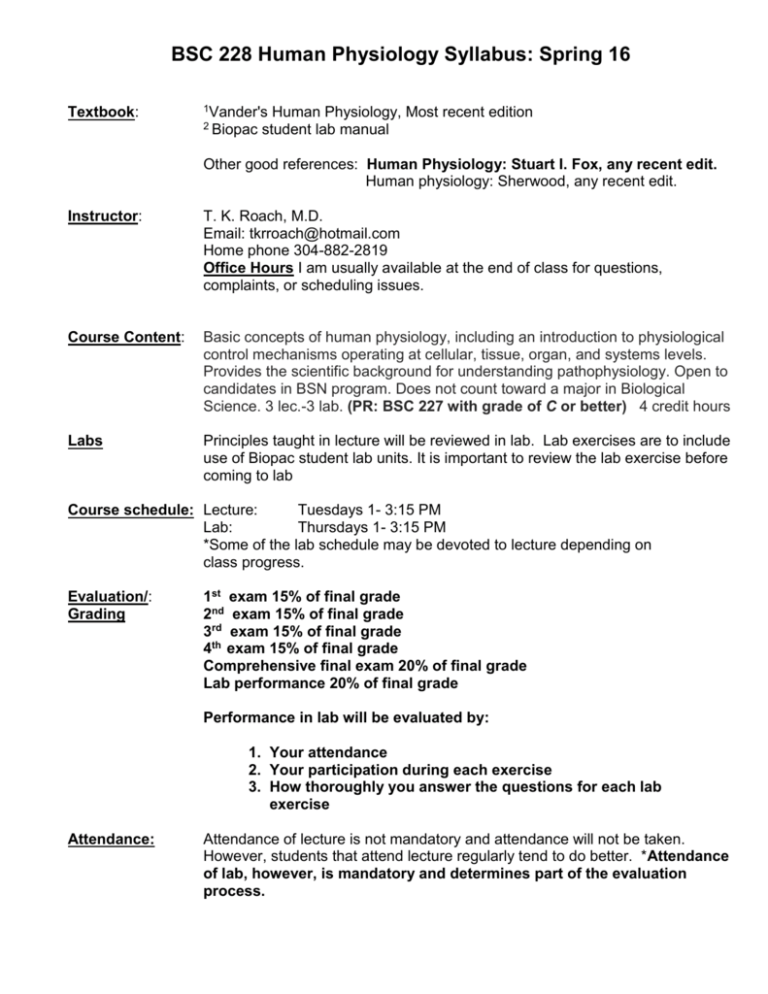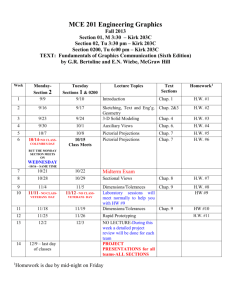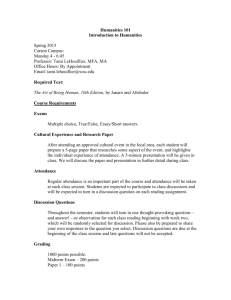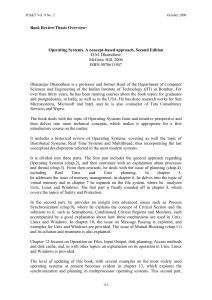BSC 228
advertisement

BSC 228 Human Physiology Syllabus: Spring 16 Textbook: 1Vander's 2 Biopac Human Physiology, Most recent edition student lab manual Other good references: Human Physiology: Stuart I. Fox, any recent edit. Human physiology: Sherwood, any recent edit. Instructor: T. K. Roach, M.D. Email: tkrroach@hotmail.com Home phone 304-882-2819 Office Hours I am usually available at the end of class for questions, complaints, or scheduling issues. Course Content: Basic concepts of human physiology, including an introduction to physiological control mechanisms operating at cellular, tissue, organ, and systems levels. Provides the scientific background for understanding pathophysiology. Open to candidates in BSN program. Does not count toward a major in Biological Science. 3 lec.-3 lab. (PR: BSC 227 with grade of C or better) 4 credit hours Labs Principles taught in lecture will be reviewed in lab. Lab exercises are to include use of Biopac student lab units. It is important to review the lab exercise before coming to lab Course schedule: Lecture: Tuesdays 1- 3:15 PM Lab: Thursdays 1- 3:15 PM *Some of the lab schedule may be devoted to lecture depending on class progress. Evaluation/: Grading 1st exam 15% of final grade 2nd exam 15% of final grade 3rd exam 15% of final grade 4th exam 15% of final grade Comprehensive final exam 20% of final grade Lab performance 20% of final grade Performance in lab will be evaluated by: 1. Your attendance 2. Your participation during each exercise 3. How thoroughly you answer the questions for each lab exercise Attendance: Attendance of lecture is not mandatory and attendance will not be taken. However, students that attend lecture regularly tend to do better. *Attendance of lab, however, is mandatory and determines part of the evaluation process. 2 Inclement weather policy In the event of bad weather, closings of MOVC will be listed on the website www.marshall.edu/movc. Also a hotline is available for school closings: 674-7239. Please contact the web site before flooding the phone lines with calls. Academic policy Exams are given at the beginning of class on the indicated dates below. The comprehensive final will be given Thursday, May 5 at 1:00 p.m. An absence during a scheduled exam must have a valid medical excuse. In the absence of a medical excuse, 10% will be deducted for each day that a student is late taking the exam. Academic dishonesty or plagiarism will result in expulsion from the class. Grading scale: 90-100 A 80-90 B 70-80 C 60-70 D <60 F Tips for doing well: 1. Don’t cram for the exams. Start early in preparing for the exams. Daily study is much better than starting the night before an exam. 2. The Powerpoint lectures that will be reviewed in class are available on each one of the computers in the library. I highly recommend saving the lectures on a portable memory device like a “flashdrive” or “jumpdrive”. The lectures can then be viewed on any computer with a Powerpoint program. To access the correct folder: "MY COMPUTER"►►”LOCAL DRIVE C"►►"USERS"►►"PUBLIC"►►"NEWPHYSIOLOGY" 3. The Lecture notes that I hand out correspond very closely with the Powerpoint lectures. They also are available on the computers in the library. Additional points: 1. Last semester's lectures were complicated by cell phones repeatedly ringing. Be thoughtful to your fellow students and minimize this problem. 2. Lecture attendance is not calculated at part of the grade. However, students that miss few lectures tend to do much better in their final grade. 3. Grades are earned, not given. Several students last semester told me that they needed a specific minimum grade to be accepted into the nursing program, radiology program, etc. A student's time is much better spent focusing their resources and energy into doing better than complaining or begging for a good grade. I detest giving bad grades, but I have to be fair. 4. If you are late for class, try not to be too noisy when you arrive. 3 Lecture schedule: This is tentative schedule depending on daily progress. Emergencies such as bad weather will be dealt with on an ad-lib basis. An asterisk indicates days that include lab activities* Date Chapter Jan 12 Jan 14 Jan 19 Jan 21 Jan 26 Jan 28* Feb 2 Introduction; Chap 1 Study of Body Function; Start Chap 2 Chap 2 Chem. Comp of the Body; Start chap 3 Finish Chap 3 Cell Structure and Genetic Control Chap 4 Enzymes and Energy; Start chap 5 Cell respiration and Metabolism Chap 5 Cell Respiration and Metabolism; start chap 6 Finish Chap 6 Cells and the Extracellular Environment; LAB (electromyography I) TEST 1 (Chap 1-6); Start Chap 7 Neurons and synapses Feb 4* Feb 9 Feb 11* Feb 16 Feb 18 Feb 23 Feb 25 Chap 7 Neurons and Synapses; LAB (electroencephalography I) Finish Chap 7; Start Chap 8 Chap 8; Central Nervous System LAB (electroencephalography II) Chap 9 Autonomic Nervous System; Start Chap 11 Start Chap 11 Endocrine system Finish Chap 11 Endocrine system TEST 2 (Chap 7,8,9,11) March 1* March 3 March 8* March 10 March 15* March 17 March 22 March 24 March 29* March 31 Start Chap 13 Heart and Circulation; LAB (EKG I) Finish Chap 13 Start Chap 14 Cardiac Output, Blood flow, and Blood Pressure; LAB (EKG II) Finish Chap 14 Start Chap 16 Respiratory Physiology; LAB (Respiratory cycle I) Finish Chap 16 SPRING BREAK; NO CLASS SPRING BREAK; NO CLASS Start Chap 17 Renal Physiology; LAB (pulmonary function I) TEST 3 (Chap 13,14,16); Chap 17 Renal Physiology April 5 April 7* April 12 April 14 April 19* April 21 April 26* Finish Chap 17 Renal Physiology; Start Chap 18 Digestive system Continue Chap 18; LAB (galvanic skin response and polygraph) Finish Chapter 18 Chap 19 Regulation of metabolism Chap 19 Regulation of metabolism; LAB (biofeedback) Chap 19 Regulation of metabolism TEST 4 (Chap 17, 18, 19); LAB (reaction time I) April 28 May 3 DEAD WEEK (review in class for final) DEAD WEEK (review in class for final) May 5 (Thursday) Comprehensive final 1:00 p.m.






